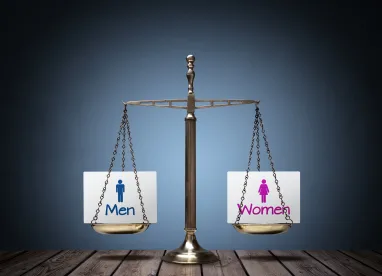After being in effect for a year, California’s groundbreaking gender parity law for public company boards, while under legal attack, has not (yet) been enjoined in a similar manner to other recent creative California regulatory initiatives (notably the law banning independent contractors in the state, part of which have now been enjoined by various courts, as well as California’s attempt to ban arbitration provisions, which has now been enjoined in its entirety). Given that the gender parity law has survived to date, a brief review of its status is in order.
SB 826, which was signed into law in 2018, mandates that public company boards with a principal executive office in California either meet certain minimum gender representation goals or face state-imposed fines.
The law requires that public companies elect at least one female director to their boards by December 31, 2019, either by filling an open seat or by adding a seat. The addition of one or two more women directors, depending upon the size of the public company’s board, is required by December 31, 2021. Companies face penalties of $100,000 for a first violation and up to $300,000 for each subsequent violation.
While the California Secretary of State has published one compliance report, with another expected at the end of the first quarter of 2020, anecdotal evidence suggests a movement toward voluntary compliance with the mandate. A recent article in the San Diego Union-Tribune noted that only one local San Diego public company out of the 90 in San Diego County subject to the mandate had failed to appoint a female director prior to the December 31, 2019 deadline.
To date, two cases have been filed challenging the law. The first case, Crest v. Alex Padilla, filed in August in the Los Angeles Superior Court, is a taxpayer-based challenge that asserts the law violates the California Constitution’s prohibition against sex-based classifications. The Crest case, which was filed by the conservative group Judicial Watch, seeks declaratory relief aimed at preventing the state from spending taxpayer funds to support or to carry out SB 826’s statutory mandate. In response to the Crest complaint, California’s Attorney General, Xavier Becerra, moved to dismiss the action on the basis of a lack of taxpayer standing and ripeness of the claims. That motion is currently scheduled to be heard in March of 2020.
The second case, Creighton Meland, Jr. v. Alex Padilla, was filed in November in the Federal District Court for the Eastern District of California. The Meland plaintiff asserts that the “Woman Quota” of SB 826 adversely impacted his right to vote as a shareholder of OSI Systems, Inc. for board candidates of his choice because of the “threat that the corporation will be fined if he votes without regard to sex.” While not alleged in the Complaint, in fact at the time the Meland Complaint was filed, the OSI Systems, Inc. board was all male. However, prior to its December 2019 proxy meeting to consider Board elections, the OSI Systems, Inc. board nominating committee presented a female candidate for election – a candidate who drew the highest number of shareholder votes at the Company’s annual meeting and now sits on the board. The Meland case was filed by the Pacific Legal Foundation, which describes itself as an organization that defends “Americans’ liberties when threatened by government overreach and abuse.”
It remains to be seen which of these cases (or others perhaps others yet to be filed) will be the first to the finish line of judicial review of SB 826.




 />i
/>i

